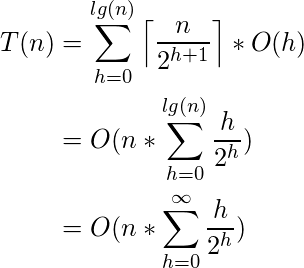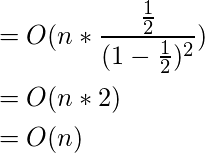A Time Complexity Question
What is the time complexity of following function fun()? Assume that log(x) returns log value in base 2.
void fun()
{
int i, j;
for (i=1; i<=n; i++)
for (j=1; j<=log(i); j++)
printf("GeeksforGeeks");
}
Time Complexity of the above function can be written as Θ(log 1) + Θ(log 2) + Θ(log 3) + . . . . + Θ(log n) which is Θ (log n!)
Order of growth of ‘log n!’ and ‘n log n’ is same for large values of n, i.e., Θ (log n!) = Θ(n log n). So time complexity of fun() is Θ(n log n).
The expression Θ(log n!) = Θ(n log n) can be easily derived from following Stirling’s approximation (or Stirling’s formula).
log n! = n log n - n + O(log(n))
Please write comments if you find anything incorrect, or you want to share more information about the topic discussed above.
Sources:
http://en.wikipedia.org/wiki/Stirling%27s_approximation
Time Complexity of building a heap
Consider the following algorithm for building a Heap of an input array A.
BUILD-HEAP(A)
heapsize := size(A);
for i := floor(heapsize/2) downto 1
do HEAPIFY(A, i);
end for
END
A quick look over the above algorithm suggests that the running time is ![]() , since each call to Heapify costs
, since each call to Heapify costs ![]() and Build-Heap makes
and Build-Heap makes ![]() such calls.
such calls.
This upper bound, though correct, is not asymptotically tight.
We can derive a tighter bound by observing that the running time of Heapify depends on the height of the tree ‘h’ (which is equal to lg(n), where n is number of nodes) and the heights of most sub-trees are small.
The height ’h’ increases as we move upwards along the tree. Line-3 of Build-Heap runs a loop from the index of the last internal node (heapsize/2) with height=1, to the index of root(1) with height = lg(n). Hence, Heapify takes different time for each node, which is ![]() .
.
For finding the Time Complexity of building a heap, we must know the number of nodes having height h.
For this we use the fact that, A heap of size n has at most ![]() nodes with height h.
nodes with height h.
Now to derive the time complexity, we express the total cost of Build-Heap as-
(1) 
Step 2 uses the properties of the Big-Oh notation to ignore the ceiling function and the constant 2(![]() ). Similarly in Step three, the upper limit of the summation can be increased to infinity since we are using Big-Oh notation.
). Similarly in Step three, the upper limit of the summation can be increased to infinity since we are using Big-Oh notation.
Sum of infinite G.P. (x < 1)
(2) 
On differentiating both sides and multiplying by x, we get
(3) 
Putting the result obtained in (3) back in our derivation (1), we get
(4) 
Hence Proved that the Time complexity for Building a Binary Heap is ![]() .
.
Reference :
http://www.cs.sfu.ca/CourseCentral/307/petra/2009/SLN_2.pdf
Time Complexity where loop variable is incremented by 1, 2, 3, 4 ..
What is the time complexity of below code?
void fun(int n)
{
int j = 1, i = 0;
while (i < n)
{
// Some O(1) task
i = i + j;
j++;
}
}
The loop variable ‘i’ is incremented by 1, 2, 3, 4, … until i becomes greater than or equal to n.
The value of i is x(x+1)/2 after x iterations. So if loop runs x times, then x(x+1)/2 < n. Therefore time complexity can be written as Θ(√n).
Time Complexity of Loop with Powers
What is the time complexity of below function?
void fun(int n, int k)
{
for (int i=1; i<=n; i++)
{
int p = pow(i, k);
for (int j=1; j<=p; j++)
{
// Some O(1) work
}
}
}
Time complexity of above function can be written as 1k + 2k + 3k + … n1k.
Let us try few examples:
k=1
Sum = 1 + 2 + 3 ... n
= n(n+1)/2
= n2 + n/2
k=2
Sum = 12 + 22 + 32 + ... n12.
= n(n+1)(2n+1)/6
= n3/3 + n2/2 + n/6
k=3
Sum = 13 + 23 + 33 + ... n13.
= n2(n+1)2/4
= n4/4 + n3/2 + n2/4
In general, asymptotic value can be written as (nk+1)/(k+1) + Θ(nk)
Note that, in asymptotic notations like Θ we can always ignore lower order terms. So the time complexity is Θ(nk+1/ (k+1))
Performance of loops (A caching question)
Consider below two C language functions to compute sum of elements in a 2D array. Ignoring the compiler optimizations, which of the two is better implementation of sum?
// Function 1
int fun1(int arr[R][C])
{
int sum = 0;
for (int i=0; i<R; i++)
for (int j=0; j<C; j++)
sum += arr[i][j];
}
// Function 2
int fun2(int arr[R][C])
{
int sum = 0;
for (int j=0; j<C; j++)
for (int i=0; i<R; i++)
sum += arr[i][j];
}
In C/C++, elements are stored in Row-Major order. So the first implementation has better spatial locality (nearby memory locations are referenced in successive iterations). Therefore, first implementation should always be preferred for iterating multidimensional arrays.
